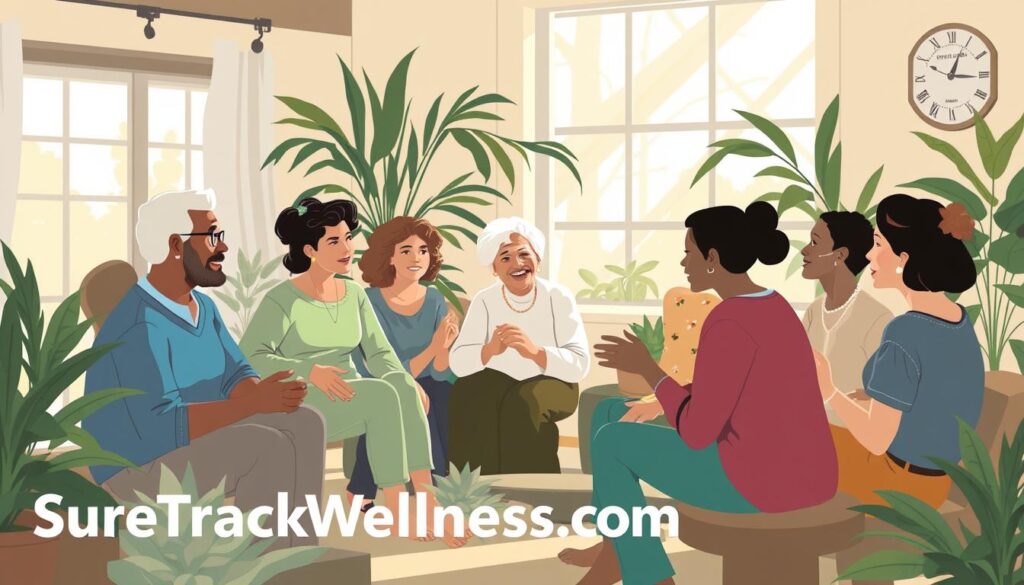In the complex landscape of chronic disease management, the power of social support has emerged as a transformative force, thanks to the groundbreaking work of renowned researcher Barbara O’Neill. Her pioneering research has shed light on the profound impact that community connections and psychosocial interventions can have on the lives of individuals living with long-term health conditions.
O’Neill’s work has delved deep into the intricate relationship between chronic disease and the social determinants of health, highlighting the critical role that personal relationships, community engagement, and access to resources play in shaping the experience and outcomes of those living with chronic illnesses. By exploring the multifaceted nature of social support, her insights have paved the way for a more holistic and effective approach to chronic disease management.
Through her extensive research and collaborations with healthcare providers, community organizations, and policymakers, O’Neill has championed the integration of psychosocial interventions into traditional medical care. Her work has demonstrated the profound impact that social support can have on the physical and emotional well-being of individuals living with chronic conditions, from mitigating the burdens of disease to fostering resilience and improving overall quality of life.
Key Takeaways:
- Barbara O’Neill’s groundbreaking research has highlighted the critical role of social support in chronic disease management.
- Her insights explore the intersection of chronic conditions and the social determinants of health, emphasizing the importance of community connections and psychosocial interventions.
- O’Neill has advocated for the integration of social support strategies into traditional medical care, demonstrating the positive impact on physical and emotional well-being.
- Her work has paved the way for a more holistic and effective approach to chronic disease management, focusing on the power of community and personal relationships.
- The insights from O’Neill’s research provide valuable guidance for individuals, healthcare providers, and policymakers in navigating the challenges of chronic disease and fostering resilience.
Understanding Chronic Diseases and Their Impact
Chronic diseases, such as heart disease, cancer, and diabetes, are long-lasting conditions that require ongoing management and care. These illnesses can have a significant impact on an individual’s physical, emotional, and social well-being. Understanding the common chronic diseases, the challenges they present, and the role of social support is essential for effective coping strategies and patient education.
Common Chronic Diseases
Some of the most prevalent chronic diseases include:
- Cardiovascular diseases (e.g., heart disease, stroke)
- Respiratory diseases (e.g., asthma, chronic obstructive pulmonary disease)
- Neurological conditions (e.g., Alzheimer’s disease, Parkinson’s disease)
- Metabolic disorders (e.g., diabetes, thyroid dysfunction)
- Musculoskeletal conditions (e.g., arthritis, osteoporosis)
- Mental health disorders (e.g., depression, anxiety)
Emotional and Physical Burdens
Chronic diseases can impose significant emotional and physical burdens on patients. The ongoing management of symptoms, the need for continuous care, and the uncertainty surrounding the course of the illness can lead to feelings of stress, anxiety, and depression. Additionally, the physical limitations and impairments associated with chronic diseases can impact an individual’s ability to perform daily activities, work, and maintain social relationships.
The Role of Social Support
Social support plays a crucial role in helping individuals cope with the challenges of chronic illness. Chronic illness coping strategies and patient education often emphasize the importance of building a strong support network, which can include family, friends, support groups, and healthcare professionals. These connections can provide emotional, practical, and informational assistance, helping patients navigate their condition and maintain a better quality of life.
| Type of Support | Description |
|---|---|
| Emotional Support | Providing comfort, empathy, and a listening ear to help individuals cope with the emotional challenges of chronic illness. |
| Informational Support | Offering advice, guidance, and educational resources to help patients understand their condition and manage their care effectively. |
| Practical Support | Assisting with daily tasks, transportation, or other logistical needs to help alleviate the physical burdens of chronic illness. |
Barbara O’Neill’s Approach to Social Support
Barbara O’Neill, a renowned expert in chronic disease management, has dedicated her career to understanding the power of social support in improving patient outcomes. Her innovative approach to self-management programs has revolutionized the way healthcare professionals address the emotional and physical challenges faced by individuals living with barbara o’neill social support for chronic disease.
Background and Philosophy
Drawing from her extensive research and personal experiences, O’Neill has developed a comprehensive philosophy that emphasizes the critical role of social networks in supporting individuals with chronic conditions. Her work has shown that self-management programs that incorporate strong support systems can significantly enhance a patient’s ability to manage their illness, adhere to treatment plans, and improve their overall quality of life.
Her Contributions to Chronic Disease Management
Through her groundbreaking studies and collaborations with healthcare providers, O’Neill has made invaluable contributions to the field of barbara o’neill social support for chronic disease. Her research findings have consistently demonstrated the positive impact of social support on self-management behaviors, emotional well-being, and long-term health outcomes for individuals living with chronic illnesses.
“The key to effective chronic disease management lies not only in medical interventions, but also in the nurturing of strong support networks that empower patients to take an active role in their care.”
O’Neill’s work has inspired the development of innovative self-management programs that integrate peer support, community resources, and technology-based solutions to address the multifaceted needs of individuals with chronic conditions.

By championing the importance of barbara o’neill social support for chronic disease, O’Neill has transformed the way healthcare professionals approach chronic disease management, ultimately improving the lives of countless individuals and their families.
The Importance of Social Support Networks
Navigating the challenges of chronic disease can be daunting, but the power of social support networks cannot be overstated. These networks come in various forms, from peer support groups to community-based programs, each playing a vital role in the well-being of individuals living with chronic conditions.
Types of Social Support
- Peer support groups: Connecting with others who share similar experiences can provide a sense of solidarity, understanding, and empowerment.
- Community-based programs: Local organizations and initiatives that offer resources, educational workshops, and opportunities for social interaction.
- Online communities: Virtual spaces where individuals can find information, share stories, and receive emotional support from a global network of peers.
Benefits of Strong Networks
Building a robust social support system can have a profound impact on the physical and emotional well-being of individuals with chronic diseases. Numerous studies have shown that strong social connections can lead to:
- Improved quality of life and overall health outcomes
- Reduced feelings of isolation and depression
- Increased motivation and adherence to treatment plans
- Enhanced coping mechanisms for managing chronic symptoms
- A stronger sense of resilience and empowerment
| Type of Social Support | Key Benefits |
|---|---|
| Peer Support Groups | Shared understanding, emotional support, and a sense of community |
| Community-based Programs | Access to resources, educational opportunities, and social engagement |
| Online Communities | Global connectivity, 24/7 access to information and support |
By prioritizing the development and maintenance of strong social support networks, individuals with chronic diseases can unlock a wealth of benefits that can positively impact their overall well-being and quality of life.
“The support I found in my local peer support group was a game-changer. Knowing I wasn’t alone in this journey made all the difference.”
Building Your Support System
Navigating the challenges of chronic disease can be daunting, but building a robust support system can make all the difference. Start by identifying your unique needs – whether it’s emotional support, practical assistance, or a safe space to share your experiences. This self-awareness will guide you in finding the right resources and connections to empower your journey.
Finding Community Resources
Reach out to local organizations, support groups, and healthcare providers to uncover a wealth of caregiver support services and online support networks tailored to your condition. These can include everything from counseling and peer-to-peer connections to educational workshops and respite care.
Engaging Family and Friends
Your loved ones can be a tremendous source of strength during difficult times. Have open conversations about your needs and how they can best support you, whether through regular check-ins, helping with household tasks, or simply being a listening ear. Remember, your support system is a two-way street – be willing to accept help and also find ways to support them in return.

“The power of community to create health is far greater than any physician, clinic, or hospital.” – Mark Hyman, MD
Building a comprehensive support system takes time and effort, but the rewards are immeasurable. By tapping into local resources, engaging your loved ones, and embracing the power of connection, you can navigate the ups and downs of chronic disease with greater resilience and hope.
Emotional Resilience Through Support
Living with a chronic illness can be a daunting and emotional journey. However, with the right mental health resources and coping strategies, individuals can build resilience and maintain a positive outlook. One of the key factors in this process is the power of social support.
Coping with Chronic Illness
Developing effective coping mechanisms is essential for managing the emotional and psychological challenges of chronic disease. This may involve a range of strategies, from practicing mindfulness and stress management techniques to seeking professional mental health counseling. Building a strong support network can also be a vital component of coping, providing a source of comfort, understanding, and practical assistance during difficult times.
Psychological Benefits of Strong Ties
- Reduced feelings of isolation and loneliness
- Improved mood and emotional well-being
- Enhanced sense of purpose and meaning
- Increased motivation and adherence to treatment plans
- Better stress management and coping skills
Research has consistently shown that individuals with robust social support systems tend to experience better mental health outcomes and greater resilience in the face of chronic illness. By cultivating strong ties with family, friends, and support groups, those living with chronic conditions can find the emotional strength and resources they need to navigate the challenges ahead.
| Mental Health Resources | Chronic Illness Coping Strategies |
|---|---|
|
|

By leveraging the power of social support and exploring a range of mental health resources and coping strategies, individuals living with chronic illness can build the emotional resilience needed to thrive and maintain a positive outlook on life.
The Role of Technology in Social Support
In the digital age, technology has become an integral part of chronic disease management, offering innovative solutions to enhance social support networks. From online communities to telehealth services and specialized mobile applications, these technological tools are transforming the way individuals with chronic conditions connect, communicate, and receive care.
Online Communities and Forums
The rise of online support networks has been a game-changer for individuals living with chronic diseases. These virtual communities provide a safe and inclusive space for people to share experiences, seek advice, and find emotional psychosocial interventions. By connecting with others who understand the unique challenges, patients can build meaningful relationships and feel less isolated.
Telehealth Services
Telehealth technologies, such as video consultations and remote monitoring, have revolutionized the delivery of healthcare services. These platforms allow patients to access medical professionals, therapists, and support groups from the comfort of their own homes, overcoming geographical barriers and improving accessibility to essential care and resources.
Apps for Chronic Disease Management
- Specialized mobile applications are designed to empower individuals with chronic conditions, offering features like symptom tracking, medication management, and personalized goal-setting.
- These digital tools seamlessly integrate with online support networks, enabling users to connect with peers, share progress, and access valuable educational materials.
- By leveraging the convenience and accessibility of smartphones, these apps complement traditional psychosocial interventions, fostering a more comprehensive and technology-driven approach to chronic disease management.
The integration of technology in social support for chronic disease management has the potential to revolutionize the way individuals navigate their health journeys. By providing a diverse range of digital resources and online support networks, these innovative solutions can enhance psychosocial interventions, improve patient outcomes, and foster a more connected and empowered community.

Case Studies of Successful Support Systems
Navigating the challenges of chronic disease can be overwhelming, but real-world examples demonstrate the profound impact of robust support systems. Through personal testimonials and case studies, we unveil the transformative power of peer support groups and community-based programs in empowering individuals to manage their conditions effectively.
Personal Testimonials
When Sarah, a 45-year-old living with type 2 diabetes, first joined her local peer support group, she was hesitant and uncertain. “I felt so alone in my struggle,” she recounts. “But the moment I stepped into that room, I was surrounded by people who understood exactly what I was going through.” Sarah found solace in sharing her experiences, learning from others’ coping strategies, and building a network of support that extended beyond the weekly meetings.
John, a 62-year-old with chronic heart disease, echoes Sarah’s sentiments. “The community-based program I joined not only provided essential medical resources, but it also nurtured my mental and emotional well-being,” he explains. “The regular check-ins, group activities, and counseling sessions helped me develop the resilience to navigate my condition with renewed confidence.”
The Impact of Community Organizations
- The ABC Chronic Disease Support Network, a community-based program in the heart of the city, has been a lifeline for hundreds of individuals living with various chronic conditions. Through comprehensive educational workshops, support group sessions, and personalized care coordination, the organization has empowered its members to take an active role in managing their health.
- The XYZ Peer Support Group, founded by a group of individuals with autoimmune disorders, has created a vibrant community where members can share their stories, receive emotional support, and collaborate on advocacy efforts. The group’s monthly meetups and online forums have been instrumental in fostering a sense of belonging and resilience among its members.
These real-life examples highlight the profound impact of peer support groups and community-based programs in helping individuals with chronic diseases navigate their journeys with greater confidence and resilience. By fostering meaningful connections and providing comprehensive support, these initiatives have the power to transform lives, one story at a time.
Creating a Personalized Support Plan
Navigating the complexities of chronic disease can be overwhelming, but with a well-crafted support plan, individuals can empower themselves and achieve better health outcomes. The key to success lies in setting realistic goals and regularly evaluating the effectiveness of one’s support system.
Setting Goals for Support
The first step in creating a personalized support plan is to identify your specific needs. Do you require assistance with self-management programs to better manage your condition? Or do you need more patient education resources to deepen your understanding of your illness? By clearly defining your goals, you can tailor your support system to address your unique challenges.
Evaluating Your Support System
- Regularly assess the resources and people in your life that provide emotional, practical, and informational support.
- Determine which aspects of your support system are working well and which areas need improvement.
- Consider seeking feedback from healthcare providers, support group members, or trusted loved ones to gain an outside perspective.
- Be open to adjusting your support plan as your needs evolve over time.
By creating a personalized support plan and continuously evaluating its effectiveness, individuals with chronic diseases can build the resilience and self-management skills necessary to navigate the challenges they face. With a strong support network and a commitment to ongoing self-care, patients can take control of their health and find the path to a fulfilling life.

| Goal | Resource | Effectiveness |
|---|---|---|
| Improve self-management of chronic condition | Local support group | Highly effective |
| Increase patient education on treatment options | Online health forums | Moderately effective |
| Develop coping strategies for emotional challenges | Therapist specializing in chronic illness | Very effective |
Challenges in Maintaining Social Connections
Navigating chronic illness can be a complex and isolating journey, as individuals often face unique challenges in maintaining their social connections. One of the primary obstacles is the misconception that chronic diseases are contagious or that individuals with these conditions are incapable of participating in social activities. This can lead to a sense of exclusion and a reluctance from friends and family to engage.
Another significant challenge is the physical and emotional fatigue that often accompanies chronic illnesses. The constant need to manage symptoms, attend medical appointments, and cope with the unpredictability of the condition can make it difficult to consistently participate in social events or maintain strong relationships. This can further contribute to feelings of isolation and loneliness.
Overcoming Isolation
To overcome the isolation that can accompany chronic illness, individuals can explore a variety of strategies. Joining support groups, either in-person or online, can provide a sense of community and a space to share experiences with others who understand the unique challenges. Engaging in hobbies or activities that align with one’s interests and abilities can also help to foster social connections and a sense of purpose.
Addressing Misconceptions About Chronic Illness
Educating friends, family, and the broader community about the realities of chronic illness can play a crucial role in addressing misconceptions and fostering more understanding and inclusive environments. By sharing personal experiences and correcting misinformation, individuals can help to dispel the myths and stigma often associated with chronic diseases.
Additionally, mental health resources, such as counseling or support groups, can be invaluable in helping individuals with chronic illness navigate the emotional and psychological challenges they may face, further empowering them to maintain and strengthen their social connections.
By addressing the challenges and misconceptions surrounding chronic illness coping strategies, individuals can take proactive steps to cultivate and sustain meaningful social connections, ultimately enhancing their overall well-being and quality of life.
Advocacy and Awareness
Advocating for oneself and raising awareness about chronic diseases are crucial steps in improving patient education and caregiver support. By shedding light on the challenges faced by individuals living with chronic conditions, we can foster a more compassionate and understanding society, ultimately enhancing the quality of life for those affected.
The Importance of Education
Educating the public about chronic diseases is vital in reducing stigma and misconceptions. Patient education initiatives, such as awareness campaigns and informative workshops, can help individuals better understand the physical, emotional, and social impact of chronic conditions. This increased understanding can lead to more empathetic and supportive communities, providing a crucial foundation for caregiver support systems.
How to Advocate for Yourself and Others
Engaging in self-advocacy is a powerful tool for chronic disease patients. This may involve:
- Communicating openly with healthcare providers to ensure your needs are met
- Joining patient advocacy groups to amplify your voice and connect with others facing similar challenges
- Actively participating in the decision-making process regarding your care
- Sharing your story and experiences to raise awareness and inspire positive change
Furthermore, supporting and advocating for others affected by chronic diseases can have a profound impact. By volunteering with community organizations, sharing educational resources, or simply offering a listening ear, you can make a meaningful difference in the lives of fellow patients and caregivers.
“Advocacy is about ensuring that people’s rights and interests are protected and that they have a voice.” – Barbara O’Neill
By embracing the power of advocacy and awareness, we can work together to create a more inclusive and supportive environment for those living with chronic diseases. Through education, empowerment, and collective action, we can pave the way for a brighter future where all individuals and their caregivers receive the support they deserve.
Future Directions in Social Support for Chronic Disease
As we look ahead, the field of social support for chronic disease management is poised for exciting innovations and advancements. The pioneering work of experts like Barbara O’Neill has laid the groundwork, and new strategies are emerging to enhance the psychosocial interventions available to individuals living with chronic conditions.
Innovations in Support Strategies
One area of focus is the development of technology-driven solutions to facilitate social connections. Online communities, virtual support groups, and mobile applications are becoming increasingly accessible, allowing individuals to connect with peers and access vital resources from the comfort of their own homes. These digital platforms can foster a sense of community and provide a valuable complement to traditional in-person support systems.
Another promising direction is the integration of social support into comprehensive chronic disease management programs. Healthcare providers are recognizing the critical role that psychosocial interventions play in improving patient outcomes, and are working to incorporate support services seamlessly into the overall care plan.
The Role of Healthcare Providers
As the healthcare landscape evolves, the role of providers in facilitating social support for chronic disease is also shifting. Practitioners are now better equipped to assess their patients’ social needs and connect them with appropriate community resources and support networks. This holistic approach to care acknowledges the profound impact that social factors can have on an individual’s ability to manage their chronic condition effectively.
By embracing the principles championed by pioneers like Barbara O’Neill, healthcare systems can empower patients to build and maintain the robust social support systems that are essential for navigating the challenges of chronic illness. As we move forward, the future of social support for chronic disease management looks bright, with innovative strategies and a renewed focus on the patient as a whole person.
Conclusion: The Power of Connection
As we’ve explored, Barbara O’Neill’s groundbreaking work on social support for chronic disease management has shed light on the profound impact that strong social connections can have on an individual’s overall well-being. By fostering a deeper understanding of barbara o’neill social support for chronic disease, her research has empowered countless individuals to navigate the challenges of long-term health conditions with greater resilience and support.
Recap of Key Insights
From the importance of identifying personal needs and finding community resources, to the transformative benefits of emotional resilience and the role of technology in facilitating social support, this article has highlighted the multifaceted nature of chronic illness coping strategies. The case studies and personal testimonials have further underscored the profound difference that a well-developed support system can make in the lives of those living with chronic diseases.
Encouragement to Seek Support
As we close this exploration, the overarching message is clear: the power of connection can be a game-changer in managing chronic health conditions. Whether it’s joining an online community, reaching out to family and friends, or tapping into local support resources, the journey towards better health and well-being is not one that anyone should face alone. By actively seeking out the care and support of a strong network, individuals can unlock a renewed sense of resilience, empowerment, and hope in the face of their challenges.